Should You Do Science for Love or for Money
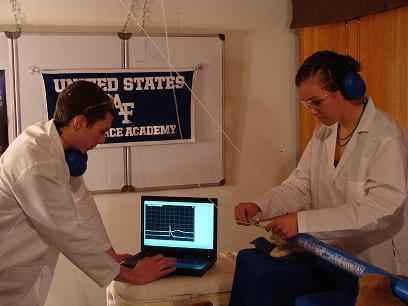
While I served on the math faculty of the US Air Force Academy, we invited numerous cadets to participate in self-funded research projects, often conducting experiments like this one in the basement of our home.
When I look over the most highly cited papers and my favorite accomplishments, I am struck by the fact that most of the projects were not funded by an external research grant and many were not even performed while I was “on the clock” in a scientific position. I guess that makes me an amateur. My deep love of science began in elementary school, and I’ve never allowed not getting paid for a project keep me from pursuing interesting scientific ideas.
Shortly after soldiers began returning home from conflicts in Iraq and Afghanistan, it became apparent that blast-induced traumatic brain injury (TBI) was affecting a lot of them. Scientists began investigating in earnest how blast exposure could injure the brain and how soldiers could be better protected. A big challenge here is that the expense, legal requirements, and facilities needed to experiment with high explosives greatly limited the laboratory experiments that could be conducted. Blast simulation devices using compressed air (called shock tubes) were available, but these were poorly documented and had the drawback of the “jet effect” of venting all the compressed gas used to generate the shock wave into the subject under test, thus resulting in a total momentum transfer much different from exposure to a real explosive blast.
We submitted an unsuccessful grant proposal and took other steps to acquire funding. We’d written a paper reviewing the hypothetical TBI mechanisms and summarizing the evidence supporting a thoracic mechanism of blast TBI, but this was not sufficient to acquire funding for further work. I recall going down to our basement and considering whether a potato cannon without a potato could serve as a more effective laboratory shock tube. First, I shot a wadded-up paper ball a few times, and then I glued a piece of paper over where the chamber meets the barrel and tried it that way. Over the years, several of our shock tube inventions were inspired by projectile launchers without the projectile, with our most important device (an oxy-acetylene driven shock tube), inspired by the golf ball launcher in a YouTube video. None of these projects was funded at the time, though we have since earned a few bucks helping other laboratories install them, conducting experiments with shock tubes in our lab, and training scientists in other labs how to make the most productive use of our shock tube designs. It is satisfying to solve a problem in a basement with less than $1000 in hardware store materials that others had been awarded six and seven-figure grants to solve.
Those who focus on the revenue-generating potential of science often forget that Einstein’s most famous papers were written while he was employed as a reviewer in a Swiss patent office. We would also do well to remember that Watson and Crick persisted in their efforts to model the structure of DNA without external funding even after they had been officially taken off the project and assigned other duties by the Cavendish lab. The history of science has many examples of unfunded side projects yielding great discoveries.
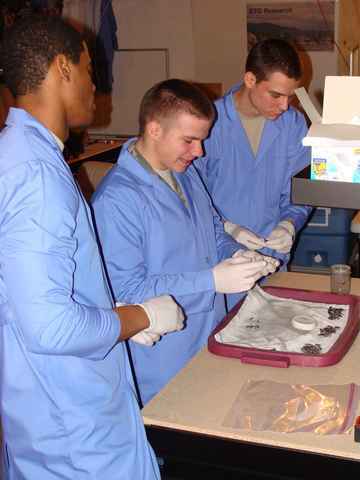
USAFA Cadets in our basement lab working on a self-funded project to measure barrel friction of lubricated bullets.
At every lab I’ve worked in, there are unfunded side projects. My freshman lab experience was at the LSU Aquaculture facility where the funded project was work geared toward the economical production of soft-shelled crawfish for the seafood market. The side projects included attempts to breed rare blue crawfish and improving grape production in Louisiana. When I landed in a physics lab, many of my duties were devoted to the unfunded side projects attempting to generate the 9th harmonic of a Nd:YAG laser in a mix of noble gases and an attempt to measure the coherent dephasing in a jet of Ar:OH-. My research mentor eventually became one of the leading gurus in high-harmonic generation in rare gases.
My graduate research was supposed to be high-resolution laser spectroscopy of diamagnetic Rydberg atoms as a means of probing quantum chaos, and this was the description of the project in the grants that were paying the bills. However, the experiment hit some snags detecting Rydberg atom production in the magnetic field. About the same time, while brainstorming in my advisor’s office, we realized that non-hydrogenic Rydberg atoms in an electric field would most likely exhibit classical chaos and provide a sensitive probe for important questions in quantum chaos. After I wrote the code and conducted an analysis demonstrating classical chaos in the system, my advisor approved a side project where I would machine the needed capacitor plates for applying an electric field, and we proceeded to conduct a series of productive experiments on lithium Rydberg atoms in an electric field. The side project became my thesis research (and the thesis projects of subsequent grad students), and the magnetic field experiments were forgotten.
Sure, there needs to be some way to pay the bills. For most of my career, work as an engineer, teaching, and/or consulting projects have provided the income streams. I have always chased interesting ideas with a passion that has not been hindered by the lack of funding. Good science comes more from the love and desire to get the right answer to an interesting question than it comes from a sense of duty from getting paid or a desire to increase one’s bank account. A lot of my best science has been funded out of my own pocket, yet the delight of being the first to gaze upon one of nature’s mysteries is well worth the investment.
I grew up working in bars and restaurants in New Orleans and viewed education as a path to escape menial and dangerous work environments, majoring in Physics at LSU. After being a finalist for the Rhodes Scholarship I was offered graduate research fellowships from both Princeton and MIT, completing a PhD in Physics from MIT in 1995. I have published papers in theoretical astrophysics, experimental atomic physics, chaos theory, quantum theory, acoustics, ballistics, traumatic brain injury, epistemology, and education.
My philosophy of education emphasizes the tremendous potential for accomplishment in each individual and that achieving that potential requires efforts in a broad range of disciplines including music, art, poetry, history, literature, science, math, and athletics. As a younger man, I enjoyed playing basketball and Ultimate. Now I play tennis and mountain bike 2000 miles a year.

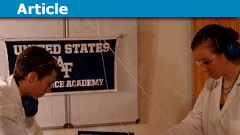

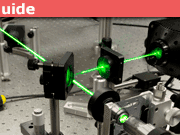
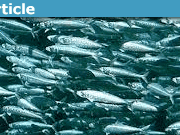


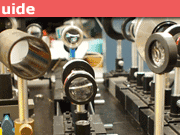
[QUOTE=”SMPS-PHYSICS, post: 5175258, member: 561156″]Now I’m shifting my career back to physics lectureship after 15+ years and have applied in many schools, academies, institutes, and universities.[/QUOTE]
Luckily I got teaching job. At least now I would be able to manage my very basic expenses! Thanks.
[QUOTE=”Dr. Courtney, post: 5170544, member: 117790″]Dr. Courtney submitted a new PF Insights post
[URL=’https://www.physicsforums.com/insights/science-love-money/’]Science for Love or for [/URL]money[/QUOTE]
I lost all of my money while doing power electronics projects, though I was a registered design consultant for last 6+ years and had around 11 years of design experience before that in some private companies. The hard luck began when I got my foot injured while practicing taekwondo on a heavy duty training bag at my home with full power many years back. i still feel the pain of same magnitude if stand up for couple of hours. I was bound to continue engineering design profession due to my interest in research and development area. The good thing that I’m still practicing taekwondo, however now my specialty in cardio taekwondo in which there is no sparring or body contact and whose main purpose is to develop health and fitness along with it’s defensive nature. Now I’m shifting my career back to physics lectureship after 15+ years and have applied in many schools, academies, institutes, and universities. If I can’t get offer from there then I’m ready offering home tuition services.
Dr Courtney,
Do you think there is a parallel , or “isomorphism” between Love vs Money and New , original , ideas and avenues vs gradual, technical improvements? I mean, publish-or-perish does not give you much of a chance to experiment, least you don’t produce on demand, but love allows you to develop research “you can believe in”. .
[QUOTE=”atyy, post: 5172724, member: 123698″][USER=117790]@Dr. Courtney[/USER]: when were you a farmer?
[/QUOTE]
My wife and I owned a small farm business from 1995 to 2006.
[QUOTE=”atyy, post: 5172724, member: 123698″]Also, how was the USAFA barrel friction project self-funded. How much did it cost, and did you pay or the cadets pay?[/QUOTE]
The barrel friction project was paid for by the small company my wife and I own, BTG Research. If I recall correctly, it cost about $2K. The Army Research Laboratory had been in need of accurate methods for measuring bullet friction for sometime to support their internal modeling efforts (computer codes to predict muzzle velocity and chamber pressure based on powder burn) and to make projectile and barrel choices to reduce friction. Barrel friction robs 20-30% of a projectile’s energy in 5.56 NATO. The Army had paid about $54k for a contractor to develop tests measuring the force required to push bullets through rifle barrels with a rod at relatively slow rates. This effort produced some papers like these:
[URL]http://www.arl.army.mil/arlreports/2007/ARL-CR-593.pdf[/URL]
[URL]http://www.dtic.mil/dtic/tr/fulltext/u2/a499555.pdf[/URL]
We had first stumbled upon our method by re-analyzing a data set from an experiment that had originally been performed to test a new formula for predicting gyroscopic stability of bullets in flight, so the method more or less fell into our hands for free once the bullet stability experiment had been completed. We immediately knew that we had not only solved the Army’s problem for needing a simple, cheap, and accurate way to measure bullet friction, we had also invented a way to test whether the purported bullet lubricants touted in patent and marketing claims really worked.
The new method and our results in several applications caused a nice stir at the 2014 International Ballistics Symposium. I expect it might be a nice funding stream for us once the DoD starts funding small arms research again in earnest.
[QUOTE=”atyy, post: 5172724, member: 123698″][USER=117790]@Dr. Courtney[/USER]: when were you a farmer?
Also, how was the USAFA barrel friction project self-funded. How much did it cost, and did you pay or the cadets pay?[/QUOTE]
:approve: :oldwink:
[USER=117790]@Dr. Courtney[/USER]: when were you a farmer?
Also, how was the USAFA barrel friction project self-funded. How much did it cost, and did you pay or the cadets pay?
[QUOTE=”Dr. Courtney, post: 5171961, member: 117790″]That’s got potential to be a great parody. You and Weird Al should work it out.[/QUOTE]
Thanks, : ) , I will have my people (i.e. me) email his people.
Do science for nothing and chicks for free (I want my MTV).
Doing science ‘for the love of it’ gets extremely old when you’re approaching 40 years old, have little saved, still have student loan debt to pay off, and are still a post-doc hoping and praying for a faculty position that doesn’t exist.
Tons of scientists are employed in healthcare or biopharma related fields, and R and D jobs constantly get axed. My former boss was an ivy graduate, 20+ years experience, 300+ articles, 40+ patents, and head of discovery. He’s been laid off multiple times over the course of the past 5 years and has had to constantly relocate. How can anyone buy a home or establish a family in a certain place if you have to constantly sell your house and relocate because scientific jobs in industry are so unstable? It gets old fast.
Even when you make it in academia the problems still don’t end. Ever work for a PI with a funding problem? I think I’ve seen my PI age by 10 years within the past 2 years. We’re down to 2 people now after cutting down from 7 and have been plagued with funding problems for the past several years with no end in sight. This gets old too after your 12th straight grant application gets rejected.
[QUOTE=”Greg Bernhardt, post: 5171045, member: 1″]”I’ve never allowed not getting paid for a project keep me from pursuing interesting scientific ideas.” – great quote![/QUOTE]
There’s a proverb along the lines of “All hard work brings a profit, but he who chases fantasies lacks judgement.”
Eventually, good science has a pay day (at least the expectation value of good science is a positive return). It’s hard to predict when and where and how it will happen. I try to worry about doing good science and not worry too much about counting the beans.
[QUOTE=”J.J.T., post: 5170595, member: 560601″]There’s money in science? I only know debt…:cry:
Edit: had to get in there first :P but seriously the reason I decided to study science was very much the same. We are and will always be enamored with the days/nights spent in the garage/basement or in the kitchen(oops). My mother used to get so pissed at me when I was little and I would take like literally everything in the house apart (good times)
I’m a little younger so I don’t have any professional anecdotes to add, but remembering the days when literally everything was a mystery still almost brings a tear to my eye.
I’d like to add an open apology to all mother’s of itty-bitty scientists all over:
Sorry we took everything apart. Especially your favorite hair-dryer, but you should keep in mind that at least 50% of the time we were able to put it all back just right. So maybe don’t get so mad about those ones.[/QUOTE]
I’ve never gone into debt chasing scientific ideas. Gotta make enough dough to keep the ship afloat, and it has never been a problem.
There’s money in science? I only know debt…:cry:
Edit: had to get in there first :P but seriously the reason I decided to study science was very much the same. We are and will always be enamored with the days/nights spent in the garage/basement or in the kitchen(oops). My mother used to get so pissed at me when I was little and I would take like literally everything in the house apart (good times)
I’m a little younger so I don’t have any professional anecdotes to add, but remembering the days when literally everything was a mystery still almost brings a tear to my eye.
I’d like to add an open apology to all mother’s of itty-bitty scientists all over:
Sorry we took everything apart. Especially your favorite hair-dryer, but you should keep in mind that at least 50% of the time we were able to put it all back just right. So maybe don’t get so mad about those ones.
Sorry to hear of your financial difficulties.
One think I have noticed as a key difference between responding to a new idea with just doing it vs. writing a grant proposal is that writing a grant proposal introduces a long delay in between having the idea and executing it.Even if a grant proposal gets funded, the delay of months or years can cause a loss of momentum with regard to following up an getting started on the original research idea.
This is an interesting question. One might make a better case for parallels in theory than in experiment. I can certainly think of more counter examples in experimental science.I recall vividly David Pritchard's explanation that he wanted his group (atomic physics, MIT) and the physicists he trained to be the trailblazers leading the charge to discover new and interesting things rather than the technical clean up crew who followed behind crossing the Ts and dotting the Is. We were neighbors to those guys on the second floor of building 229, so I interacted with them often.I was in awe both of the atom interferometer experiments (led by David Keith as a grad student) and their trapping and cooling work (taken over by Wolfgang Ketterle en route to BEC). It's hard to imagine how this kind of physics could be done without external funding.So I think there is likely a bimodal distribution in the probability distribution of likelihood of trailblazing physics vs. funding level. There is certainly opportunity for productive work at any funding level (including zero), which was the point of my original article.
Great post Dr . Courtney!I think it's easy to focus on the funding and allow that to impede the answer to problems. Once a person becomes a properly trained scientist, and develops an interest in some practical problem, there are lots of opportunities to make a significant contribution.I think sharing experiences like this is very important to help people move away from the idea that you need to get the right pedigree and a grant from the right institution before you can make any progress in science.Cheers!
That's got potential to be a great parody. You and Weird Al should work it out.
When I was a farmer, I was appalled at the other farmers who always had someone else to blame (often the government) when earning a living was harder than they had hoped and the things that worked last year don't keep working indefinitely. My attitude was more entrepeuneurial. I wasn't owed a good income just by being a farmer and working hard and producing lots of food. It was my responsiblity to develop markets and make sure the food I was producing could be sold at a sufficient profit to keep the ship afloat.While I made money as a farmer, profit potential did not determine my level of satisfaction with different farm projects. We never made much money in the sheep business (we did in cattle), but I liked raising sheep and it was very satisfying for the hired shearer to remark that when he died, he wanted to come back as a sheep on my farm! The way customers clamored for our tender and tasty beef was more satisfying than cashing the checks. Grapes were much more profitable than apples, but oh the smell of the apple orchards in October!I've made a lot of money as an engineer and as a teacher, but it is not the sound of money in the bank that satisfies me. It is simply the joy of a job well done – the students who succeed beyond their wildest dreams and the products that deliver on all their promises to the customer.
"I’ve never allowed not getting paid for a project keep me from pursuing interesting scientific ideas." – great quote!